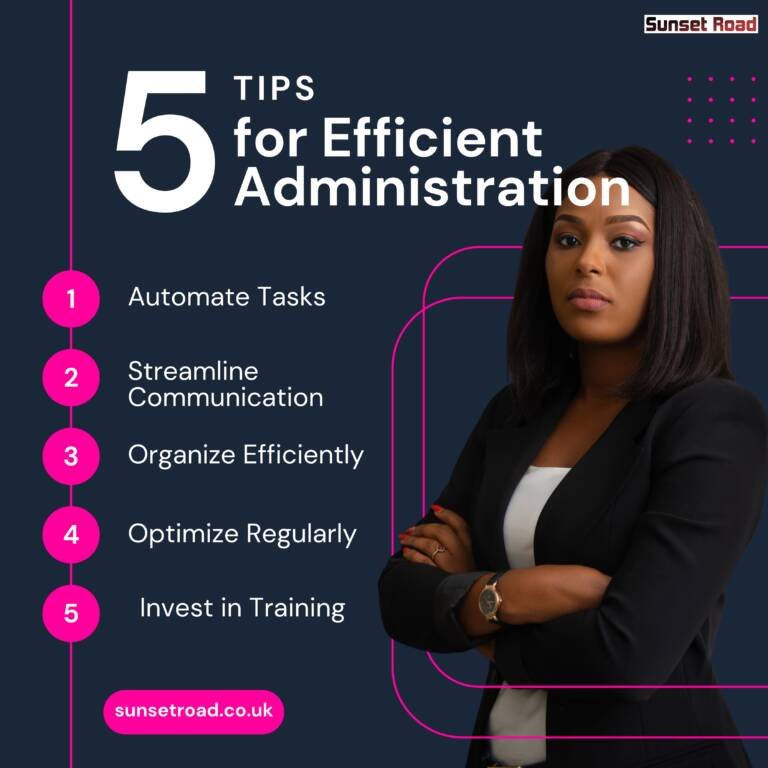Streamlining Business Administration: Essential Tips for UK Companies
In today’s competitive and fast-paced business world, efficient administration is crucial for success. UK businesses, in particular, must juggle unique regulations, a dynamic market, and increasingly complex customer demands. Streamlining business administration can significantly boost productivity, reduce costs, and improve overall operational efficiency. This blog outlines essential tips for UK companies, illustrating them with relevant case studies, to help businesses enhance their administrative functions.
1. The Importance of Efficient Business Administration
Effective business administration is about managing a company’s operational tasks, such as managing human resources, financial oversight, and regulatory compliance. For UK companies, particularly those navigating complex tax and employment laws, streamlining these administrative functions can:
- Improve efficiency
- Reduce errors and costs
- Ensure compliance with UK laws and regulations
- Enhance customer service and business agility
With technology rapidly evolving, businesses now have access to innovative tools that can simplify administration and free up time for more strategic activities.

2. Automation: The Key to Streamlining Repetitive Tasks
Case Study: Automating Payroll for Efficiency
- Company: Green Landscapes Ltd. (Edinburgh, UK)
Green Landscapes Ltd., a growing landscaping company, struggled with manual payroll management, which was time-consuming and prone to errors. By switching to an automated payroll system using Sage, they cut processing time by 60% and reduced payroll errors to almost zero. The savings allowed them to redirect administrative staff to focus on customer service, improving client relationships. Key Takeaway: Automating repetitive tasks like payroll or invoicing can reduce administrative workload and errors, allowing businesses to reallocate resources more efficiently.
2.2. Optimizing Communication and Collaboration Tools- Effective internal communication and collaboration are critical components of streamlined administration. UK businesses, especially those operating in multiple locations or with remote teams, can benefit from tools like Microsoft Teams, Slack, and Zoom. These platforms help employees stay connected, manage tasks efficiently, and ensure clear communication across departments.
3. Enhancing Communication and Collaboration with Digital Tools
Efficient communication is the foundation of streamlined administration, especially for businesses with remote teams or multiple branches. Adopting collaboration tools like Slack, Microsoft Teams, and Zoom enables teams to communicate effectively, track project progress, and collaborate on tasks in real-time, reducing bottlenecks and miscommunication.
Case Study: Improving Team Collaboration
Company: Digital Wave Marketing (Manchester, UK)
Digital Wave, a UK-based marketing agency, experienced communication difficulties as it grew. Managing projects across different teams was inefficient, often resulting in missed deadlines and misaligned goals. By adopting Microsoft Teams, they centralized communication, introduced a task management system, and improved overall project tracking. This helped them reduce project delays by 35%, improving client satisfaction. Key Takeaway: Utilizing modern collaboration tools improves team coordination, reduces miscommunication, and enhances project efficiency.
4. Outsourcing Non-Core Functions
Outsourcing non-core business functions, such as IT support, HR management, or legal services, is a common strategy for streamlining administration. By partnering with experts in these fields, UK businesses can reduce overhead costs while gaining access to specialized knowledge. Outsourcing allows companies to focus more on their core business activities.
Case Study: Outsourcing IT Support
Company: Urban Property Solutions (Bristol, UK)
Urban Property Solutions, a real estate management firm, faced IT challenges that slowed their administrative processes. After evaluating their needs, they outsourced IT support to a local service provider, which reduced internal IT-related disruptions by 40%. With improved system performance and reduced downtime, they could focus more on managing properties and client relations. Key Takeaway: Outsourcing non-core functions like IT and HR can reduce costs, improve service quality, and enable businesses to focus on strategic goals.
5. Implementing Cloud-Based Solutions for Data Management
Cloud-based tools such as Google Workspace and Microsoft Office 365 have become essential for streamlining data management and administrative processes. With cloud computing, UK businesses can store data securely, access it from anywhere, and collaborate with colleagues in real-time. Cloud solutions also provide backup options, reducing the risk of data loss.
Case Study: Adopting Cloud Technology for Better Efficiency
Company: Northern Crafts (Leeds, UK)
Northern Crafts, an e-commerce company specializing in handmade goods, struggled with managing inventory and order data across multiple locations. After adopting a cloud-based inventory management system, they saw a 50% reduction in stock errors and improved coordination between their stores. Real-time data access allowed them to manage orders more effectively, which led to a 20% increase in sales. Key Takeaway: Cloud-based solutions simplify data management, enhance collaboration, and ensure that businesses can access critical information from anywhere.
6. Regulatory Compliance: Streamlining to Avoid Penalties
Navigating the UK’s regulatory environment can be challenging for businesses. From tax laws to GDPR compliance, staying up to date with regulations is crucial to avoid penalties. Compliance management software like Curo or MyCompliance can automate monitoring tasks, sending alerts when new regulatory changes occur, and ensuring that a company’s processes remain compliant.
Case Study: Automating GDPR Compliance
Company: FinServe Solutions (London, UK)
FinServe, a financial services firm, found it difficult to manually track GDPR compliance across its operations. By implementing compliance management software, they automated data protection processes and received real-time updates on regulatory changes. This led to a 35% reduction in administrative time spent on compliance and ensured their practices were fully aligned with UK law. Key Takeaway: Using compliance management tools simplifies regulatory tracking and ensures businesses stay compliant with evolving UK regulations.
7. Training and Upskilling Employees
Employees play a critical role in streamlined administration, so investing in their training is essential. Regular training ensures that staff members are familiar with the latest software tools and administrative procedures, reducing errors and improving efficiency.
Case Study: Upskilling Employees for Better Efficiency
Company: EduBright Tutors (Liverpool, UK)
EduBright Tutors faced administrative bottlenecks as their business expanded, primarily due to employees’ limited knowledge of new software tools. After implementing an employee upskilling program that trained staff on new project management software, they saw a 30% improvement in workflow efficiency. The streamlined operations allowed them to handle more clients without increasing administrative costs. Key Takeaway: Upskilling employees ensures they can effectively use new technologies and systems, boosting overall administrative efficiency.
8. Digital Transformation and AI: The Future of Administration
Digital transformation has become vital for businesses looking to streamline administrative tasks. AI and machine learning tools can enhance forecasting, customer management, and data analysis. AI-driven chatbots, for example, can handle routine customer queries, reducing the burden on customer support teams and improving response times.
Case Study: Leveraging AI for Customer Support
Company: Tech Gear Ltd. (Birmingham, UK)
Tech Gear Ltd., an electronics retailer, was overwhelmed with customer support queries, which affected response times. By introducing an AI chatbot, they managed to automate 70% of their routine customer interactions, allowing the human support team to focus on complex inquiries. Customer satisfaction improved by 25%, and they were able to handle a higher volume of inquiries without increasing staff. Key Takeaway: AI tools can streamline customer service and other administrative functions, enabling businesses to handle a greater volume of tasks more efficiently.
Conclusion
For UK businesses, streamlining administration is essential to stay competitive and compliant with regulations. Automation, cloud-based tools, outsourcing non-core functions, and training employees are all key strategies for reducing administrative burdens and improving operational efficiency. By adopting these strategies, companies can better manage their resources, reduce costs, and ultimately, improve their bottom line. As demonstrated by the case studies, businesses that invest in modernizing their administrative processes will find themselves more agile and better positioned to tackle future challenges. Streamlined administration isn’t just about efficiency—it’s about positioning your company for sustained growth and success in an ever-evolving marketplace.











